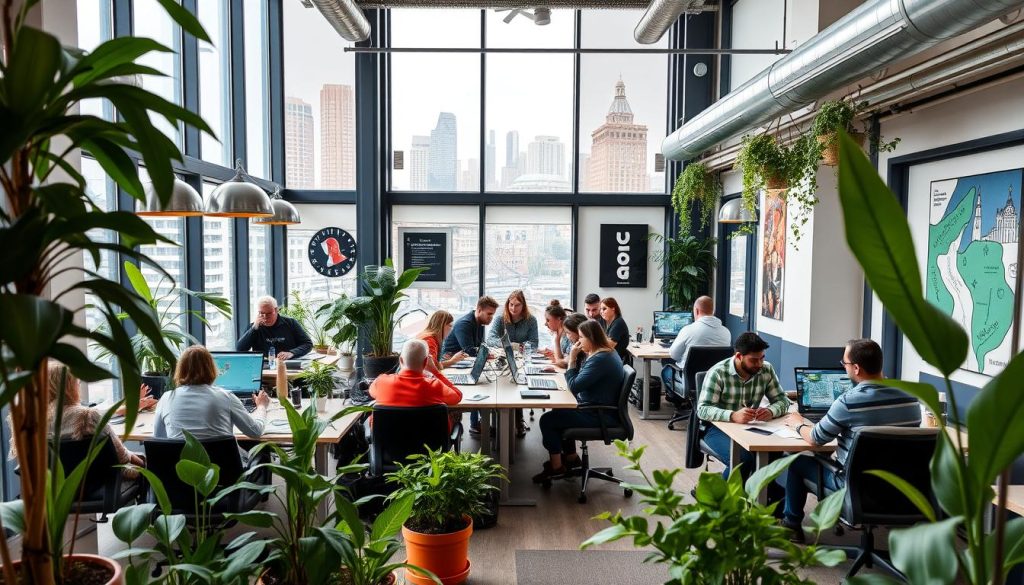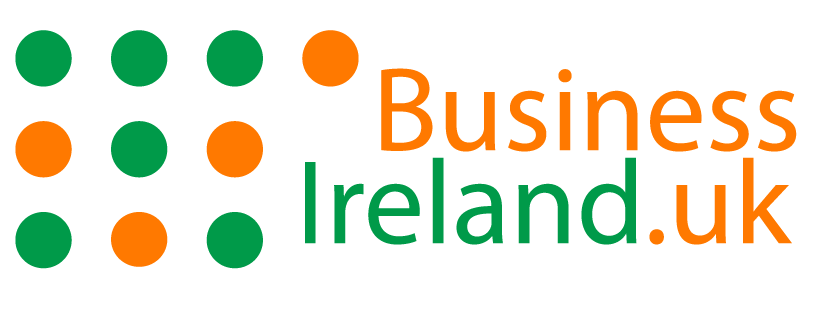Ireland’s tech sector is changing fast, with new advancements and innovations. These changes show its growing importance as a key tech hub in Europe. Digital transformation and the arrival of big companies are big factors. Also, the rise of Irish start-ups is driving new trends.
This mix of global trends, new tech, and changing market needs makes Ireland a top spot for tech innovation. It’s a place where technology and business come together to shape the future.
Key Takeaways
- Ireland’s tech sector is rapidly growing, influenced by digital transformation.
- The role of multinationals is significant in shaping tech industry trends.
- Homegrown start-ups are becoming increasingly influential in the tech landscape.
- Globalisation plays a pivotal role in the development of technology innovation in Ireland.
- Technological advancements are closely aligned with market demands.
- Ireland’s position as a tech hub is reinforced by its dynamic economic environment.
Overview of Ireland’s Tech Sector
Ireland’s tech sector is strong and growing fast. It plays a big part in the country’s economy. Over the last ten years, Ireland has become a major player in the global tech world. This is thanks to the rise of tech companies in areas like software, cybersecurity, and artificial intelligence.
More people are finding jobs in tech, offering a wide range of roles. These jobs need skills in engineering and data analysis, among others. This growth not only adds to the workforce but also boosts Ireland’s economy. The tech sector is a big contributor to the GDP and helps keep the economy stable.
Here’s a table that shows how the tech industry is growing and creating more jobs:
| Year | Number of Tech Companies | Tech Sector Employment | Contribution to GDP (%) |
|---|---|---|---|
| 2018 | 1,200 | 130,000 | 5.5 |
| 2019 | 1,350 | 145,000 | 6.0 |
| 2020 | 1,450 | 160,000 | 6.5 |
| 2021 | 1,600 | 175,000 | 7.0 |
| 2022 | 1,750 | 190,000 | 7.5 |
The growth of Ireland’s tech sector is vital for the country’s economy. As it keeps growing, it will shape the future of jobs and innovation in Ireland.
Key Players in Ireland’s Tech Landscape
Ireland’s tech scene is shaped by big names and local innovators. Companies like Google, Facebook, and Microsoft lead with big investments and thousands of jobs. They’ve made Ireland a key spot for tech in Europe.
But it’s not just the big names. Irish companies like Stripe and Intercom also play big roles. They’re known for their work in online payments and customer communication. These companies show the power of local talent and innovation.
These tech giants and local firms work together, creating a strong tech community. This teamwork leads to sharing of ideas and expertise. Together, they’re shaping Ireland’s tech future, opening doors for growth and new ideas.
Start-up Culture and Innovation Hubs

The start-up scene in Ireland is buzzing with creativity and entrepreneurship. Innovation hubs are at the heart of this, offering support and resources to new businesses. They help through mentorship, funding, and more. This creates a space where start-ups can grow and thrive together.
Incubators and Accelerators Driving Growth
In Ireland, places like Dogpatch Labs and NDRC are key for start-ups. They offer networking and programmes to help entrepreneurs. This support helps start-ups overcome challenges and succeed.
Here’s a look at some top Ireland incubators and what they do:
| Incubator Name | Location | Key Focus Areas | Support Offered |
|---|---|---|---|
| Dogpatch Labs | Dublin | Tech Start-ups | Mentorship, Funding, Events |
| NDRC | Dublin | Digital Start-ups | Accelerator Programmes, Investment |
| Portershed | Galway | Software Development | Co-Working Space, Networking |
Impact of Universities on Start-ups
Universities in Ireland play a big role in the start-up world. Places like Trinity College Dublin and University College Dublin push entrepreneurship with research and incubators. They link academic knowledge with industry needs, leading to successful businesses.
This partnership between schools and businesses is key for the growth of the start-up scene.
Artificial Intelligence Developments
The world of artificial intelligence in Ireland is changing fast. It’s becoming a key place for new ideas in tech. Many AI companies are coming together to make this technology better.
Places like the AI Research Centre and Teagasc are leading the way in research. They work on things like machine learning and natural language processing. Working together, industry and schools make sure new ideas help both businesses and people.
Start-up companies are making big strides in AI. They’re using smart automation to make manufacturing better and improving how we interact with customers through AI. This growth is boosting the economy and making Ireland important in AI worldwide.
Important events and conferences happen all year, bringing people together. These events help innovators, investors, and leaders meet. As AI becomes more crucial, focusing on talent and teamwork will keep Ireland at the forefront of AI.
Remote Work and Hybrid Models
The shift to remote work in Ireland has changed how we work, thanks to the COVID-19 pandemic. Many tech companies saw the need to change and started using hybrid work models. These changes made work more flexible and helped us look at how productive and happy employees are.
Changing Workforce Dynamics
More companies in Ireland now let employees work from home, making it easier to manage work and life. The tech industry has been a big part of this change, using digital tools to help teams work together from anywhere.
Studies show that people are more productive and happier at work now. This is because they save time commuting and have more control over their work. Also, working from anywhere means companies can hire the best people from all over.
Hybrid models bring many benefits but also some challenges. Keeping the company culture strong and making sure everyone has the same chances are key issues. To succeed, managers need to adapt their strategies to fit these new ways of working.
| Aspect | Remote Work | Hybrid Work Models |
|---|---|---|
| Flexibility | High | Moderate to High |
| Employee Satisfaction | Increased | Generally Increased |
| Productivity | Improved | Varies |
| Talent Attraction | Broadens Talent Pool | Competitive Advantage |
| Challenges | Isolation, Communication | Cultural Cohesion, Equity |
Rise of Fintech in Ireland

The financial technology sector in Ireland is growing fast. This growth comes from new solutions that make payments, banking, and investing better. The Central Bank of Ireland helps by creating a good place for fintech to grow. It supports innovation and keeps customers safe.
Regulatory Environment Supporting Fintech Growth
The rules for fintech in Ireland help both new and big companies. The Central Bank of Ireland makes a place where fintech can grow. It lets companies test their new ideas in a safe space before they start.
Successful Fintech Start-ups to Watch
Some Irish fintech companies are changing the way we think about money. They show how innovation and success can go hand in hand. Key players include:
- Revolut: This company has changed how people manage money around the world with its easy currency exchange and spending tracking.
- N26: It’s a mobile bank that offers simple banking without hidden fees, appealing to those who love technology.
- TransferMate: It makes sending money across borders easy and affordable for businesses, helping them succeed globally.
These companies show how fintech in Ireland is changing traditional finance. They highlight the sector’s potential to change how we use financial services.
| Fintech Company | Key Feature | Impact on Financial Services |
|---|---|---|
| Revolut | Multi-currency accounts | Helps consumers and businesses with global transactions |
| N26 | No fees banking | Makes banking more accessible to everyone |
| TransferMate | Efficient cross-border payments | Lowers costs and makes business payments easier |
Cybersecurity Challenges and Solutions
Cybersecurity in Ireland faces many challenges due to more cyber threats. The tech sector’s growth means businesses must protect sensitive data from hackers. Data privacy is a big worry, especially with new rules making things stricter.
Companies are tackling these issues with a mix of strategies. They’re working with top cybersecurity firms to strengthen their security. This helps them spot and fix weak spots before hackers can exploit them.
Investing in strong security tech is key too. Many firms use security frameworks with threat detection, encryption, and plans for handling incidents. These steps not only boost security but also make customers feel safer with their data.
The government is also helping to make cybersecurity better. It supports efforts to improve security and spread awareness. Working together, the public and private sectors can make the internet safer. This helps lessen the effects of cyber threats.
Impact of Climate Tech on Ireland’s Tech Sector
The rise of climate tech has changed Ireland’s tech scene a lot. More people now know about the environment, and Irish companies are making their businesses greener. They’re doing this in areas like renewable energy, making clean energy and cutting down on carbon emissions.
Government support and EU rules help these new technologies grow. Ireland’s Climate Action Plan is one example, pushing for more investment in climate-friendly tech. This plan brings companies together to work on sustainability.
Start-ups are key in moving climate tech forward. They can change quickly and try out new green ideas. This makes a lively place for new tech and green solutions to grow.
When tech and the environment work together, it can help the economy grow and reduce climate risks. As we focus more on green tech, working together across industries is crucial. This creates a strong community to fight climate change.
Diversity and Inclusion Initiatives in Tech
Ireland’s tech sector is now seeing the value of diversity through various inclusion efforts. Companies are launching programmes to draw more women into tech. These efforts aim to close the gender gap and boost innovation and creativity.
Women in Technology Programs
The Cyber Ireland Women in Cyber Program is a great example. It helps women pursue tech careers by offering training and mentorship. The program has made strides in increasing female presence in tech. Yet, more work is needed to keep up the progress and support women in their careers.
Ethnic Diversity in Tech Companies
Companies are also focusing on ethnic diversity. They’re creating inclusive workplaces to encourage diverse teams. These diverse teams solve problems more effectively and innovate better. Many firms have set diversity goals and offer scholarships to underrepresented groups.
Creating a welcoming space is key to drawing in diverse talent. This ensures everyone can share their unique views and help move tech forward.
Growth of Health Tech and Biotech
The health tech in Ireland is growing fast, thanks to new ideas in telehealth, medical devices, and biopharmaceuticals. The biotech sector is leading this change, making patient care better and health services smoother. New medical technology is changing healthcare, offering better solutions that help more people.
Dublin-based companies are at the heart of this growth, working on diagnostics and treatments. They use the latest tech to make treatments and diagnostic tools better. This helps meet the need for quality healthcare solutions. The link between health tech and biotech leads to new discoveries in drug development and managing diseases.
Leaders in the industry and academics are working together to improve health tech. This partnership leads to new medical devices and apps that solve big healthcare problems. It helps keep Ireland at the top of medical technology innovation.
| Company Name | Focus Area | Contribution to Health Tech |
|---|---|---|
| Medtronic | Medical Devices | Innovative solutions for chronic disease management |
| Amgen | Biopharmaceuticals | Advanced therapies for cancer and complex diseases |
| ResMed | Telehealth | Remote monitoring for respiratory conditions |
| HSE | Health Services | Integrating technology into public health strategy |
This exciting scene is set to get even better, tackling the challenges of an ageing population and more chronic illnesses. The health tech in Ireland shows how technology can change healthcare, making it more efficient and focused on the patient.
Emerging Trends in Data Analytics
Data analytics trends are changing how businesses work in Ireland. Big data has opened up new chances for companies to innovate and improve. By using lots of information, businesses can make quick decisions based on data, keeping up with market changes and what customers want.
Artificial Intelligence and machine learning are key in these trends. They help automate data analysis, making it easier to find important insights. Predictive analytics lets companies guess what the market will want, helping them plan better. This way, they can stay ahead in a fast-changing market.
Many industries in Ireland are gaining a lot from data analytics. For instance, healthcare uses it to make patient care better with new diagnostic tools and treatment plans. Financial services use it to spot fraud and reduce risks, while offering services that feel more personal to customers.
| Industry | Use of Data Analytics | Impact |
|---|---|---|
| Healthcare | Predictive modelling for patient outcomes | Improved care delivery and patient satisfaction |
| Retail | Customer behaviour analysis | Enhanced inventory management and sales strategies |
| Finance | Fraud detection algorithms | Increased security and tailored customer experiences |
Data analytics technology is always getting better, which could make Ireland a top spot for innovation. Companies that get on board with these changes will likely do well in the digital world. As this field grows, focusing on ethical data use will be key to gaining trust from consumers and building strong relationships.
Role of Government in Tech Sector Development

The Irish government is key in making the tech sector grow. It does this through strategic plans and support. These efforts make Ireland a top place for tech businesses. The National Digital Strategy is a great example, aiming to make Ireland a digital leader by boosting innovation and tech use in all areas.
The government also helps the tech industry by giving out funds and grants. This money is vital for projects in new tech areas like AI, data analytics, and cybersecurity. It helps startups and big companies grow.
Working with schools is another way the government supports tech. It brings universities and tech companies together. This ensures there are skilled people ready for the tech world’s needs. It makes sure Ireland stays ahead in tech.
This support shows the government’s dedication to keeping Ireland at the top of tech progress.
| Government Initiative | Description | Impact on Tech Sector |
|---|---|---|
| National Digital Strategy | A framework aiming to enhance digital technology adoption. | Strengthens the digital economy and promotes innovation. |
| Funding Programmes | Financial support for startups and tech development. | Facilitates research, innovation, and growth. |
| Educational Partnerships | Collaboration between universities and tech firms. | Ensures a skilled workforce and encourages innovation. |
Future Job Market Trends in Technology
The tech job market is changing fast, thanks to new tech advancements. As industries change, so do the skills needed for jobs. It’s crucial to keep learning new skills to fit into these new roles.
Upskilling and Reskilling Opportunities
To stay ahead in the tech job market, you need to keep improving your skills. Schools and training groups are key in helping with this. They work with tech companies to fill skills gaps and prepare workers for the future.
Important skills to focus on include:
- Advanced data analytics
- Artificial intelligence and machine learning
- Cybersecurity methods
- Cloud computing technologies
- Software development frameworks
Working together, industries and training groups make upskilling easier. They make sure training meets what the job market needs. This helps create a workforce ready for new tech challenges. Here’s a look at some top skills projects in Ireland’s tech sector:
| Initiative | Description | Partnering Organisation |
|---|---|---|
| Tech Skills Academy | A programme offering training in digital skills for professionals and graduates. | Universities and tech firms |
| Cybersecurity Bootcamp | Intensive training focused on critical cybersecurity skills. | Local colleges |
| AI for Everyone Initiative | Free workshops and resources to encourage AI literacy among non-technical workers. | Tech industry leaders |
Challenges Facing Ireland’s Tech Sector
The Irish tech sector is doing well but faces big challenges. One major issue is the lack of skilled workers. Companies like Google and Facebook have set up shop in Ireland, making it hard to find the right people.
This competition affects how companies hire people and puts pressure on schools to change their courses. It makes finding skilled workers even harder.
Also, getting investment in the tech industry is tough. The world economy is changing fast, making it hard for start-ups and established companies to get funding. Entrepreneurs struggle to find investors to help them grow and innovate.
They must plan carefully and look for new ways to fund their businesses. This is because finding money is not easy.
There are also rules that make it hard to work in tech. Laws about data protection and following rules change often. Companies need to be quick to adapt and know what’s needed.
Dealing with these issues means being proactive and finding new ways to solve problems. This way, the Irish tech sector can keep growing and stay strong, even when things change a lot.







